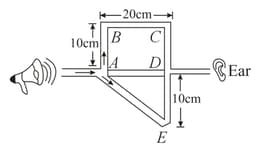HARD
Physics
IMPORTANT
Earn 100
The pulse shown in figure has a speed of If the linear mass density of the right string is that of the left string, find the ratio of the height of the transmitted pulse to that of the incident pulse.



Important Questions on Superposition and Standing Waves
HARD
Physics
IMPORTANT
Two coherent narrow slits emitting sound of wavelength in the same phase, are placed parallel to each other at a small separation of . The sound is detected by moving a detector on the screen at a distance from the slit , as shown in the figure. Find the distance such that the intensity at is equal to the intensity at .

HARD
Physics
IMPORTANT
The figure shows a tube structure in which a signal is sent from one end and is received at the other end. The frequency of the sound source can be varied electronically between, and Find the frequencies at which maxima of intensity are detected. The speed of sound in air,

MEDIUM
Physics
IMPORTANT
In Quinck's acoustic interferometer, it is found that the sound intensity has a minimum value of, units at one position of the sliding tube, and continuously climbs to a maximum of , units at a second position, from the first. Find
The frequency of the sound emitted by the source and,
The relative amplitudes of the two waves arriving at the detector. The velocity of sound in air
MEDIUM
Physics
IMPORTANT
The equation of wave in a string fixed at both end is Find the phase difference between oscillations of two points located at and
MEDIUM
Physics
IMPORTANT
The third harmonic of a certain piano wire ( and ) has a frequency of What is the wavelength of the fundamental?
MEDIUM
Physics
IMPORTANT
Two wires of ratio of lengths and tensions in the ratio have the ratio of their fundamental frequencies having ratio Find the ratio of their masses.
HARD
Physics
IMPORTANT
A string vibrates with a frequency Its length is doubled and its tension is altered until it begins to vibrate with frequency What is the ratio of the new tension to the original tension?
HARD
Physics
IMPORTANT
A -long wire having a mass of is fixed at both ends. The tension in the wire is maintained at What are the frequencies of the first three allowed modes of vibration?
